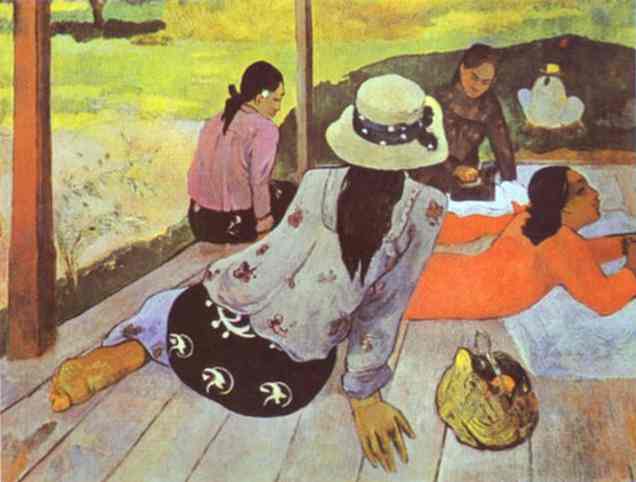Description
The painting "Siesta" from 1894, created by Paul Gauguin, is an intriguing work that captures the essence of everyday life in a context that transcends the simple representation of a moment. In this work, Gauguin displays his signature post-impressionist style, characterized by the exploration of color, form and emotion, elements that are masterfully intertwined in this composition.
The scene depicts two reclining women in an environment evoking the warmth of a peaceful day. Both figures, with indigenous features, are found resting against a warm, brown background, against which green, nuanced vegetation peeks through. The arrangement of the figures is deliberately simple, reflecting Gauguin’s search for the primordial and spiritual in everyday life. These women, often identified as part of Gauguin’s Tahitian environment, convey a sense of tranquility and familiarity that invites the viewer to meditate on the role of the siesta, not only as a physical rest, but as a space for deep introspection.
As for the color palette, the use of warm, earthy tones along with the inclusion of a subtle vibrancy of more intense colors such as blues and greens, highlights the influence of his work in Polynesia. Gauguin had an innovative approach to color, using it not only to create a sense of realism, but as a means to express his personal vision of the world. In "Siesta," the use of color translates into an almost dreamlike atmosphere, where the use of shadows and light combine to give an emotional depth to the scene.
One of the most notable features of this painting is the way the female figures, with their relaxed postures and connection to nature, evoke aspects of Tahitian culture, which so fascinated Gauguin during his stay on the island. The ideal of a life in harmony with nature and the search for spiritual purity are reflected in every stroke, suggesting a longing to escape the complexities of the Western world of his time. In this sense, Siesta acts not only as a representation of everyday life, but also as a meditation on the desire for simplicity and authenticity.
Gauguin, like his other post-impressionist contemporaries, moved away from realistic representation to explore new dimensions of human experience. Siesta aligns with his interest in symbolic elements and the spirituality of indigenous cultures. In this sense, the work can be seen as an attempt to find a balance between the influence of the primitive and emerging modernity.
Gauguin's style, which has made his works unmistakable, emphasizes the idea that painting should not simply reflect reality, but also interpret and transform the visual experience. "Siesta" is a work that reflects his constant search for the truth behind the surface, enveloping the viewer in an atmosphere where time seems to stand still. Like many of his works, this painting becomes a sensory refuge where one is invited to contemplate and reflect on the very essence of existence. Through the serene and thoughtful depiction of everyday life, "Siesta" stands as a testament to Gauguin's unique talent and his ability to connect the personal with the universal in the history of art.
KUADROS ©, a famous painting on your wall.
Hand-made oil painting reproductions, with the quality of professional artists and the distinctive seal of KUADROS ©.
Painting reproduction service with satisfaction guarantee. If you are not completely satisfied with the replica of your painting, we will refund 100% of your money.

